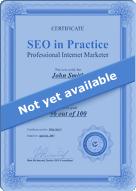4.8 Grow your links regularly and at a natural speed
I already made a mention of this before, when talking about link farms — remember? But here it is again:
Grow your links at the right pace.
Let′s think: normally sites do not get thousands of backlinks overnight. It doesn′t happen that often that crowds of people all of a sudden put links to you, all within a day or two. As this doesn′t look natural, Google may pretty well frown on this.
All right, you may think But why do these link farms still exist, maybe it′s not that bad at all?
Hm... here′s what happened with my friend′s website.
He was selling snowmaking equipment.
The competition there isn′t severe and after doing simple on–page optimization and arranging
a couple of links he easily got a #5 place in Google for the keyphrase snow blowing machine.
Sure, he wished to get higher — and he went to those link farms. Mitch got about half a million
links one day, and some hundred thousand more next day. I mean, he practically got them all at
once. And — instead of the higher rank he expected he got... what do you think? Lowered in ranking?
Not that simple. Totally dropped from top 10 results — for quite a long time! Sure this was a bad lesson.
Therefore, do NOT get thousands of links pointing to your website all at once. If you do this, you are asking Search Engines for trouble. Better increase the number of your backlinks gradually. For instance, raise the number of backlinks you get slowly but surely, by 30 to 50 links a week. Hope you remember that they should also target diverse anchor texts and not just commercial ones. This helps you stay in the clear and build your links the natural way.
Moreover, it′s better to be getting links regularly, without long breaks. For instance, it′s better to get 30 links each week than 500 links today and then nothing for the whole month.
4.9 Look where the link can be placed
Links can sit on different pages of a website, and this makes surprisingly big difference for how profitable a link is. Let′s talk about this.
Sitewide links: safe or not?
Some sites will place a link to you on each page of the site — and this link is called sitewide. As a rule this link will be sitting on the same place of each page, like footer, blogroll or sidebar.


Example of sitewide links in the sidebar
A sitewide link has good potential to bring you traffic — as it can be found on every page, the same user will see the same link numbers of times. Sure, this makes bigger chances that sooner or later the link will get a click.
However, today sitewide links can bring you more bad than do any good: if Search Engines assume that your sitewide link is paid — they might penalize your website and lower your ranking. Besides, if you get a hundred of links from the same domain it won′t bring as much value as 10 links from 10 different domains could bring, because diversity matters.
That′s how Matt Cutts puts it in one of his videos: "If we see a link from a domain, we might count it once, but if we see 50 links from a domain, we still might choose to only count it once".
"…if I were a manual webspam analyst, sort of doing an investigation, and we got a spam report, you′re an English site, and you′ve got a site–wide Polish link or something like that or vice versa, it looks commercial or it looks off–topic, low–quality or spammy, then that can affect the assessment on whether you want to trust the out–going links from that site."
Also, it is quite easy to see that a link in a blogroll with any anchor text other than the name of the website is unnatural. So with sitewides, you should be careful. By the way, if you′re getting them for traffic only, then you can use the rel="nofollow" attribute to be on the safe side.
Link from the homepage
You can get a link from a site′s homepage, that is, from the main page of the site (URLs of these pages end with the domain name — .com, .org — or .de etc.), for instance www.somesite.com
A link from a homepage has a lot of value, and it′ll hardly look suspicious to Search Engines (like sitewide links do). If you have an inbound link from a PageRank 5 homepage, this is a big add up to your rankings — and looks quite natural.
Link from an inner page
A link can also stand on an inner page — any page deeper than a site′s homepage.
Its URL looks like this:
http://www.mysite.com/innerpage.html
or like this...
http://website.example.org/so_many_pages/here_we_go.htm
A link from a deeper page is not so valuable as, say, a link from the homepage. But if a homepage has a PageRank of 6, part of this will definitely pass to the inner page that′s linking to you — and in turn, you′ll also get part of its high rank.
Moreover, some inner pages rank very high themselves — so they can be really good. And, as links from deeper pages are not tremendously weighty, you will get these much easier than links from homepages or sitewide links. So don′t waive the idea of getting links from inner pages.



Answer
Answer
Answer
Answer
Answer
Answer
Answer
Answer
Answer
Answer
Answer
Answer